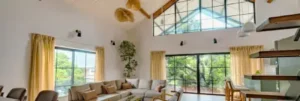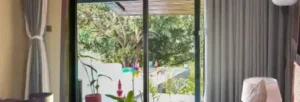
Casement vs Sliding Windows – Which is Better for Your Home?
Are you contemplating which type of window to choose for your home – a casement window or a sliding window? With the numerous styles available, it can be tough to decide which one is a better fit for your needs. In this detailed comparison of casement window vs sliding window, we will provide you with an in-depth understanding of both types and help you make an informed decision.
Casement Window vs Sliding Window: Quick Comparison
Before we delve into the details, let’s glance at a quick comparison to understand the basic differences between a casement and sliding window.
| S.No | Factors | Casement Window | Sliding Window |
| 1. | Definition | Casement windows are hinged at the side and open outward/inwards like a door. | Sliding windows slide horizontally along the window frame. |
| 2. | Operation | Operated with a crank or lever. | Operated by sliding the sash from side to side. |
| 3. | Cost | Generally costlier due to their complex mechanism. | Usually less expensive than casement windows. |
| 4. | Efficiency | Very energy & sound insulation efficient due to tight seal when closed. | Energy & sound efficiency depends on quality but typically slightly lower than Casement |
| 5. | Maintenance | Easy to clean | Easier to maintain due to fewer mechanical parts. |
Casement Window vs Sliding Window: In Depth Comparison
Let’s dissect the differences between casement and sliding windows based on various factors to help you understand which one is better for your specific needs.
-
Energy Efficiency
Casement windows, due to their airtight seal, are highly energy efficient. They prevent air leakage, maintaining the indoor temperature and reducing energy costs.
On the other hand, sliding windows are also efficient, but their efficiency depends heavily on the quality of the window. In cheaper models, the windows can develop gaps over time that allow air to seep through.
Winner: Casement Windows
-
Ventilation
With casement windows, you can open them completely, allowing full airflow into your home. They are perfect for areas where you want maximum ventilation.
Sliding windows, however, can only be opened halfway. But they still provide sufficient airflow, especially the larger ones.
Winner: Casement Windows
-
Natural Light
Both windows can be very effective in providing natural light. However, sliding windows are typically sleeker in design and more suitable for large opening allowing more natural light
Winner: Casement Windows
-
Safety and Security
This depends more on the type of local, accessories like anti-lift plug & type of glass. More windows can be customised to provide adequate safety and security.
-
Aesthetics
This factor is largely subjective and depends on personal preference. Casement windows have a classic look that pairs well with traditional or historic home styles. They offer an unobstructed view of the outdoors.
Sliding windows have a more contemporary, sleek look and can save space since they don’t swing out.
Winner: Tie
-
Durability
Both the window types are durable.
-
Space Consideration
Casement windows swing out when opened, which could interfere with outdoor areas like walkways, patios, or decks.
Sliding windows don’t require any extra space to open or close, making them an ideal choice for areas where space is at a premium.
Winner: Sliding Windows
These are some key factors to consider when deciding between casement and sliding windows. Both types of windows offer unique benefits, and your choice should align with your home’s architectural style, the climate you live in, and your specific needs and preferences.
Casement Window vs Sliding Window – Verdict
After considering all the factors, both casement and sliding windows have their unique benefits and drawbacks. The choice between casement and sliding windows depends largely on your personal preference, budget, and specific needs.
Bottom Line
Choosing between a casement and sliding window doesn’t have to be difficult. Now that you’re equipped with the information about both types, you’re one step closer to deciding the best fit for your home. Do you have any other questions about casement window vs sliding window? Let us know in the comments below!
Frequently Asked Questions
-
Which window is cheaper: casement or sliding?
Sliding windows are generally cheaper than casement/openable windows due to their simpler mechanism.
-
Which windows easy to operate: casement or sliding?
Sliding windows are usually easier to operate as they simply slide along the window frame, whereas casement windows require a crank or lever to open.
-
Which window provides better ventilation: casement or sliding?
Casement windows provide better ventilation because they can be fully opened, allowing for maximum airflow. However, sliding windows can still provide substantial ventilation, while saving space and being more suitable for large openings.
-
Which window is easy to clean: casement or sliding?
Both casement and sliding windows are relatively easy to clean from the inside, but casement windows can be more challenging to clean from the outside, especially on upper floors if it does not have an easy clean feature. Sliding windows often allow both sides of the glass to be cleaned from indoors.
-
Which window is better: casement or sliding?
Both types of windows have their unique advantages. Casement windows provide excellent ventilation and have superior energy efficiency, while sliding windows offer simplicity, cost-effectiveness, and most suitable for large openings.. The choice between casement and sliding windows largely depends on your specific needs and preferences.


 +91 97699 40000
+91 97699 40000











